State of Fleet Management 2025: Challenges, Gaps and Trends
In our 2025 Fleet Management survey, we asked nearly 300 professionals to share their biggest challenges, evolving strategies and tech priorities. Here's what the data reveals – and what you can do about it.
May 13, 2025
7 min read

Key takeaways from this report
Fleetio’s 2025 State of Fleet Management report, based on insights from nearly 300 fleet professionals, reveals the sector’s top trends and operational hurdles.
-
Fleet managers face rising costs and compliance pressures: From maintenance expenses to fuel volatility and labor shortages, operational challenges are intensifying in 2025. Fleets that track true total cost of ownership (TCO) and implement clear compliance strategies are best positioned to reduce downtime and justify long-term investments.
-
Technology adoption is growing, but integration gaps remain: While 72% of fleets use dedicated maintenance software, many still juggle spreadsheets, paper forms, and multiple platforms. Centralized fleet management systems like Fleetio eliminate silos, automate admin work, and improve decision-making with real-time data.
-
Alternative fuel adoption lags despite sustainability goals: Over 80% of fleets report no EVs in operation, citing range limitations, charging access, and vehicle costs as barriers. Instead of one-size-fits-all adoption, leading fleets are pursuing case-by-case strategies to balance ROI with sustainability targets.
-
Replacement strategies lack consistency and drive surprise costs: Many fleets retire vehicles reactively based on breakdowns or rising costs rather than lifecycle planning. Standardizing replacement policies around asset age and usage helps reduce unexpected expenses and extend fleet longevity.
-
The competitive gap is widening between proactive and reactive fleets: Fleets that embrace integrated systems, data-driven planning, and workforce investment are gaining an edge. Fleetio helps leaders scale these strategies with connected workflows, predictive insights, and simplified compliance tracking.
Quick Stats
- 87% of fleet managers oversee maintenance compliance
- 81% of fleets have no EVs in operation
- 68% use maintenance software — but 50%+ juggle multiple platforms
- 30% of fleets report compliance rates below 75%
- 18% spend 8+ hours/week on manual data entry
- 38% replace vehicles based on rising costs — only 15% use asset age
- 63% cite charging access and range anxiety as top EV barriers
- 55% expect positive fleet impacts under new federal policies
Fleet manager roles and responsibilities
Our survey provided insights into the diverse fleet roles and responsibilities that managers handle in their daily operations:
- Ensuring maintenance compliance (80% of respondents)
- Promoting a culture of safety (71% of respondents)
- Expense tracking and budgeting (68% of respondents)
- Responding to fleet vehicle breakdowns (61% of respondents)
- Vehicle procurement and retirement planning (57% of respondents)
- Staying up-to-date on industry trends (55% of respondents)
- Managing fleet drivers/operators (49% of respondents)
- Entering work orders and inspections (49% of respondents)
- Managing fleet shop and technicians (43% of respondents)
This data demonstrates the multifaceted nature of the fleet manager role, which combines technical expertise, financial management, personnel supervision, and strategic planning. The high percentage of managers responsible for maintenance compliance aligns with the industry-wide focus on vehicle uptime and operational efficiency.
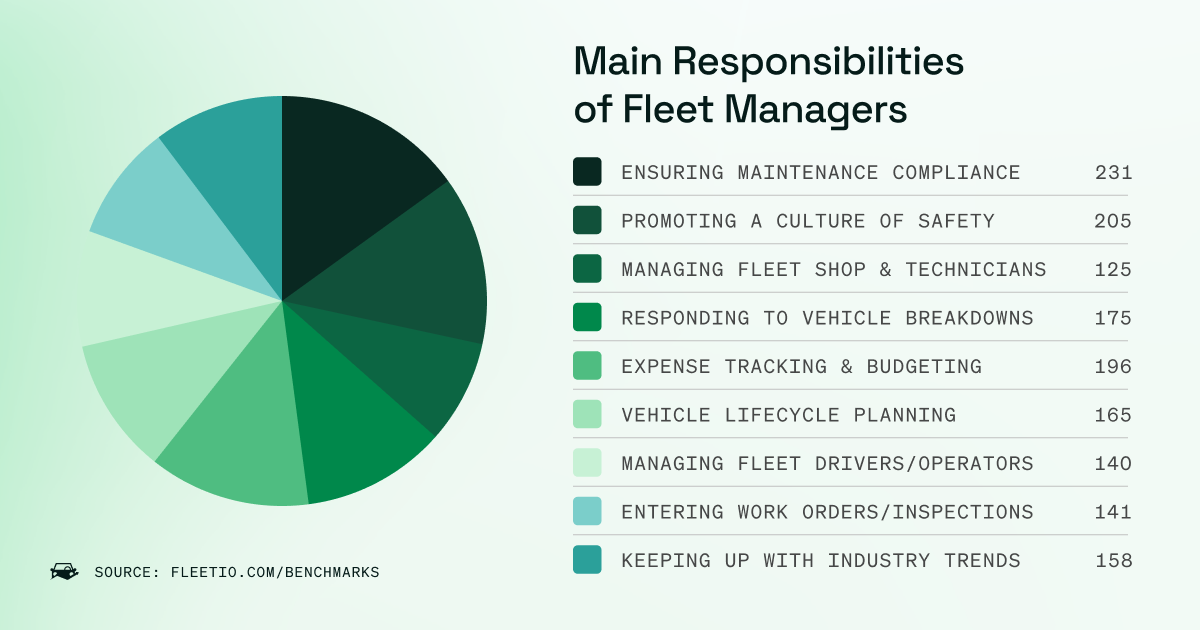
Interestingly, we found variations in responsibility distribution across different industries:
- Construction & Materials: Higher focus on shop management (79%) and breakdown response (86%)
- Trucking, Logistics & Shipping: Greater emphasis on driver management (82%) and expense tracking (84%)
- Government & Municipalities: Stronger focus on procurement planning (83%) and compliance (91%)
- Utilities & Telecommunications: More emphasis on safety promotion (76%) and industry trend monitoring (72%)
Primary fleet management challenges
Six key concerns fleet managers face
Based on our survey, the top operational challenges in 2025 are:
- Rising service and maintenance costs
- Limited vehicle and parts availability
- Technician and driver labor shortages
- Fuel price volatility
- Federal and state compliance pressures
- Complexity in adopting new fuel types and technologies
Pro tip
Fleet leaders who track true total cost of ownership (TCO) can better navigate rising costs and justify long-term investments.
Fleet maintenance compliance analysis
What good maintenance tracking looks like
Only 5% of fleets achieve near-perfect maintenance compliance (95–100%). Most hover in the 75–90% range, but nearly 1 in 3 admit to compliance issues below 75%.
Fleets with higher compliance (85%+) reported:
- 75% scheduled vs. 25% unscheduled maintenance
Fleets with poor compliance (below 50%) tended to:
- Perform < 25% scheduled maintenance
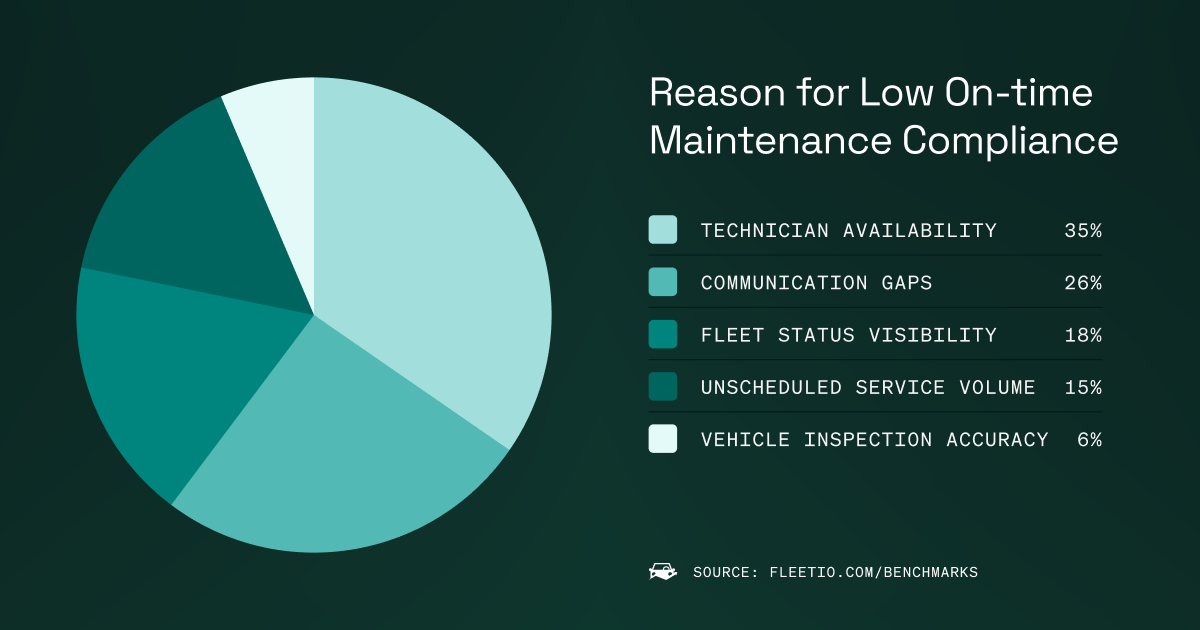
Higher maintenance compliance directly correlates with fewer breakdowns and longer asset lifespan.
Technology adoption trends
Fleet software usage is up — but integration is still lagging
Survey results show a wide range of tools used for maintenance tracking:
- 72% use dedicated fleet maintenance software
- 32% use telematics software
- 40% still rely on spreadsheets
- 19% use paper-based forms
Over half of fleets using advanced software also juggle multiple platforms, indicating ongoing challenges with software integration.
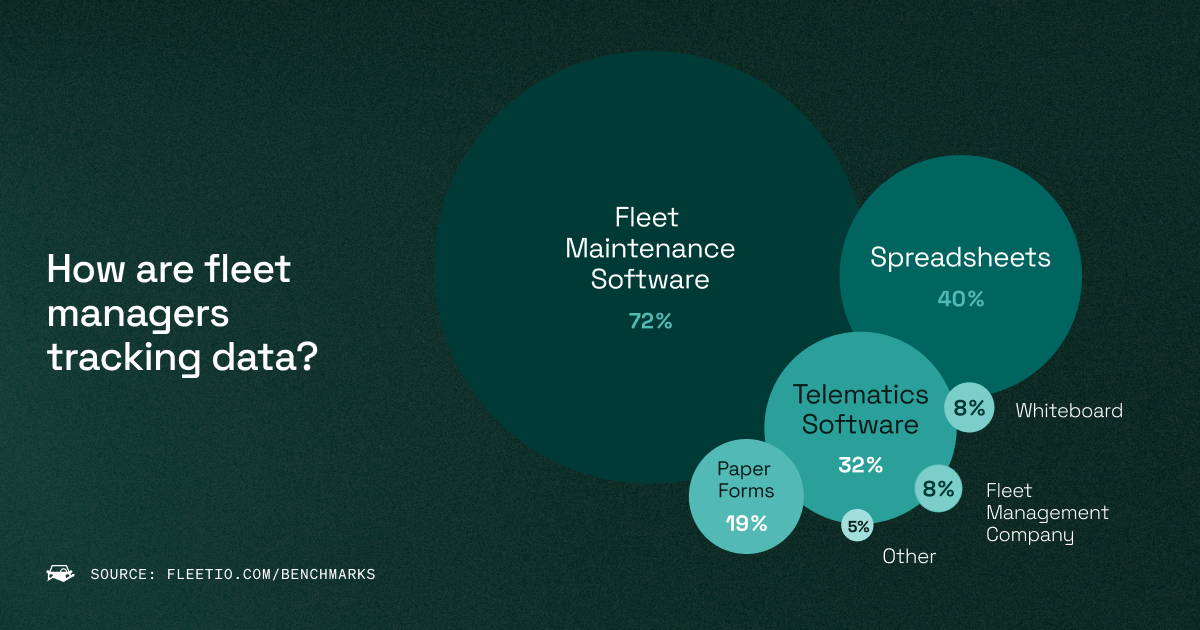
Time spent on administrative tasks
Fleet data entry is still a time sink
Manual administrative burdens remain a key inefficiency:
- 18% spend 8+ hours/week on manual entries
- 57% spend 1–4 hours/week
- Only 5% spend less than an hour
Notably, fleet size didn't correlate with admin hours – staffing levels and tech adoption had more impact.
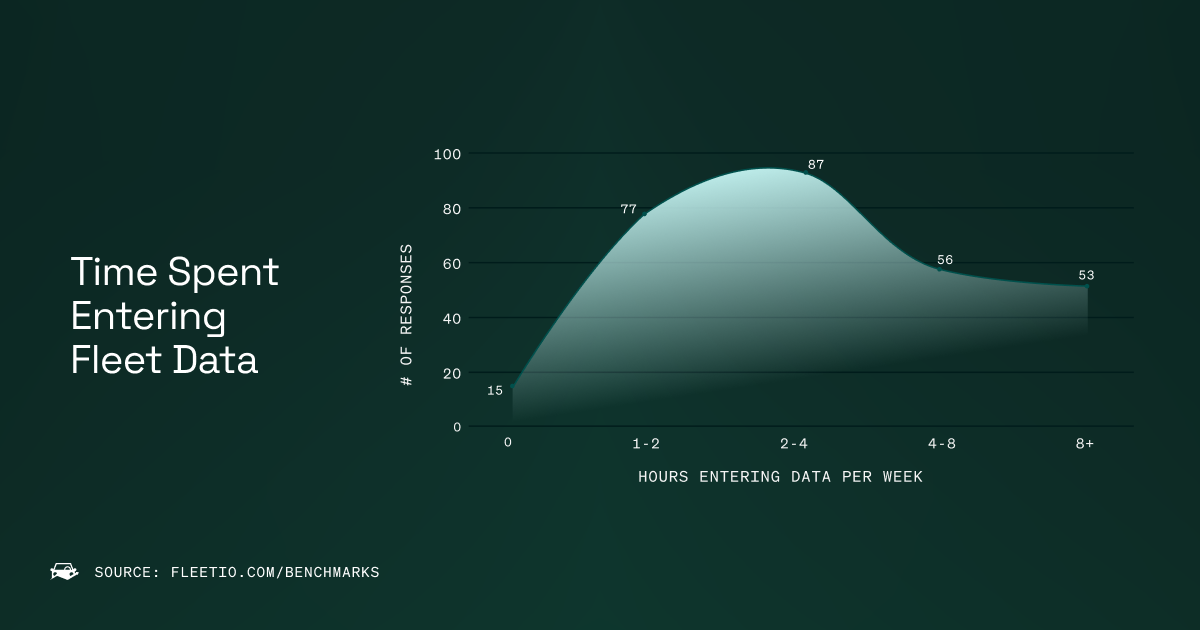
Alternative fuel adoption in 2025
Low EV and hybrid adoption rates
Despite rising sustainability goals, few fleets are embracing electric or hybrid vehicles:
- 81% have no EVs
- 74% have no hybrids
- Only 2–5% have >15% of either in their fleet
Top concerns around EV adoption
- Range limitations (63%)
- Charging infrastructure (63%)
- Vehicle costs (40%)
- Facility upgrades (54%)
Fleet replacement strategies
How fleets decide when to replace assets
Survey participants cited the following fleet asset replacement criteria:
- 38% replace based on rising costs
- 17% rely on odometer readings
- 15% use time-in-service
- 21% wait until the asset fails
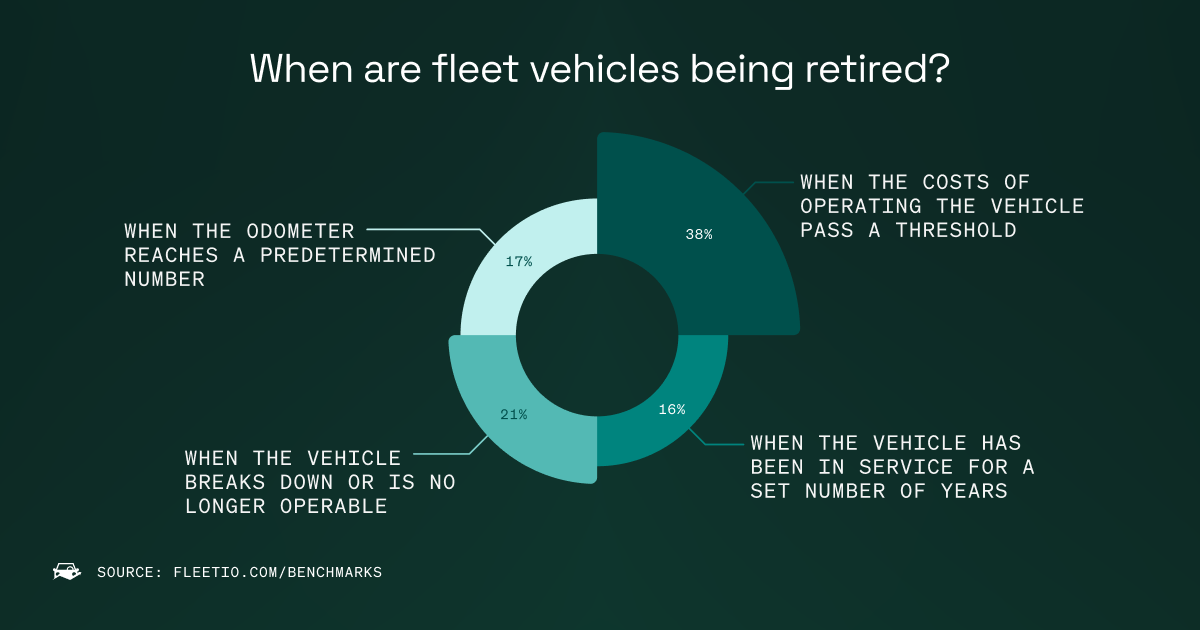
Pro tip
A clear vehicle replacement policy tied to asset lifecycle helps reduce surprise expenses.
The role of policy shifts in fleet strategy
Mixed expectations under new federal leadership
- 55% expect positive impacts
- 15% anticipate negative effects
- 30% expect no major changes
Optimism drivers:
- Lower fuel costs
- Reduced regulatory burdens
- Onshoring of parts manufacturing
Concerns:
- Tariff-induced price hikes
- Lost EV incentives
- Labor shortages from policy changes
Industry spotlight: Sector-specific trends
Construction & materials fleets
- Heavy reliance on reactive maintenance (65% unscheduled)
- Significant tech shortage — especially diesel technicians
Trucking, logistics & shipping
- Fuel cost is the top concern (87%)
- Leading adopters of telematics (46%)
Government & municipal fleets
- Strongest EV adoption (18%)
- Long-term budget cycles drive tech investment
2025 trends to watch
- Data you actually use: Fleets are shifting focus from collecting data to acting on it with tools like predictive maintenance and analytics.
- Smarter sustainability: Instead of going all-in on EVs, savvy fleets are making case-by-case decisions based on use case and ROI.
- Workforce rethinking: Apprenticeships, competitive pay and culture-building are critical as labor shortages continue.
- Stronger supply chains: Fleets are reducing risk with better inventory systems and diversified parts sourcing.
Bottom line: The opportunity gap is growing
The challenges of 2025 are real – but they're also creating a competitive advantage for fleets that move quickly, think strategically, and adopt systems that scale. Whether you’re a 10-asset team or a 1,000+ asset operation, the takeaway is the same:
Adapt now – or risk being left behind.
About this report
The State of Fleet Management 2025 report is based on a survey conducted by Fleetio between November 2024 and January 2025. Responses were collected from nearly 300 fleet professionals across North America, representing a wide range of sectors including government, trucking, construction, utilities and telecommunications. Participants ranged from small fleets with 5–14 assets to enterprise operations managing over 1,000 assets. Surveyed fleets were made up of both Fleetio customers (58%) and non-customers (42%). As a trusted leader in fleet maintenance and asset management, Fleetio publishes this report to help fleet leaders benchmark their performance and stay ahead of industry trends.
It's all in the numbers
Want more insights into the fleet industry? Check out our most recent Benchmarking Report for in-depth analysis of this survey data as well as data from actual fleets in Fleetio.
Check it out
Senior Fleet Content Specialist
As a Senior Fleet Content Specialist at Fleetio, Peyton explores the voices and experiences that shape fleet operations. She focuses on how fleet professionals adopt technology, improve efficiency and lead their teams to bring clarity and context to the challenges happening across the industry.
View articles by Peyton PanikReady to get started?
Join thousands of satisfied customers using Fleetio
Questions? Call us at 1-800-975-5304
Get Our Newsletter
Join a community of 70,000+ fleet industry professionals.
